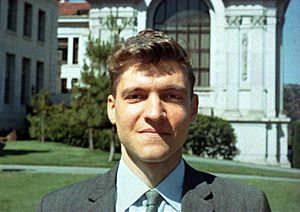Neo-Luddism facts for kids
Neo-Luddism or new Luddism is a way of thinking that is against many forms of modern technology. The word "Luddite" is often used to describe people who don't like new technology. This name comes from the original Luddites in England, who were active between 1811 and 1816.
Neo-Luddism is a movement without a single leader. It includes different groups who resist modern technologies. They often want to return to simpler forms of technology. Neo-Luddites might stop using technology, support simple living, or even try to stop technology they see as harmful. This modern movement is connected to groups like the anti-globalization movement and radical environmentalism.
Neo-Luddism is based on worries about how technology affects people, their communities, and the environment. They believe in the precautionary principle for new technologies. This means technologies should be proven safe before they are widely used, because we don't always know what problems they might cause.
Neo-Luddism is different from the original Luddism. The first Luddites were against all technology. Neo-Luddites, however, only oppose technology they believe is harmful or bad for society.
Contents
What Neo-Luddites Believe
Neo-Luddism suggests slowing down or stopping the creation of new technologies. They believe that giving up certain technologies is the best way for the future. They imagine a return to nature and simpler communities. Instead of big industries, Neo-Luddites suggest small farming communities, like those of the Amish or the Chipko movement in Nepal and India, as good examples for the future.
Neo-Luddites often don't believe that new technology can solve big problems like environmental degradation or biological weapons. They think new tech might create even more dangerous problems.
In 1990, a writer named Chellis Glendinning wrote "Notes towards a Neo-Luddite manifesto." She wanted to bring together people who shared these ideas. Glendinning described Neo-Luddites as people who question the common idea that more technology always means progress. She opposes technologies that she feels harm communities or are too focused on money and logic. She believes technology can have hidden biases. So, we should ask if technologies are made for specific reasons, like making quick profits. Glendinning also says we should think about the social, economic, and environmental effects of technology, not just personal benefits, before we use it widely.
What Could Happen Without Changes
Neo-Luddism often makes strong predictions about what will happen if new technologies continue without limits. While there isn't one single view, Neo-Luddites believe that a future without changes to technology could have serious problems. They think current technologies threaten humanity and nature. They see a societal collapse as possible or even likely.
Ted Kaczynski suggested a future with a damaged environment and more psychological disorders. He thought technology could lead to humanity being controlled. Kirkpatrick Sale also believed that industrial society, helped by powerful technologies, would not last. He predicted its collapse within a few decades. Stephen Hawking, a famous scientist, thought that machines might control how things are made. He worried that without sharing wealth, technology would make economic differences even bigger.
These predictions include humans being replaced by computers. They also worry about humans changing genetically due to less natural selection. Other concerns are the misuse of technology, like problems from genetically modified organisms, nuclear warfare, and biological weapons. They also fear humanity being controlled through surveillance or propaganda. They think humans might struggle to adapt, leading to more psychological problems, greater economic inequality, a loss of community, and massive unemployment. Finally, they believe technology could cause environmental degradation due to short-sightedness and too many people.
How Neo-Luddites Suggest Acting
In her 1990 "Notes towards a Neo-Luddite manifesto," Chellis Glendinning suggested stopping certain technologies. These include electromagnetic technologies (like computers and communication devices), chemical technologies (like synthetic materials and some medicines), nuclear technologies (like weapons and power plants), and genetic engineering (like altering crops). She argued for finding "new technological forms" that are small-scale and support social and political freedom.

In his writings, Kaczynski outlined changes he believed humanity needed to make for society to work better. He suggested "new values that will free them from the yoke of the present technoindustrial system." These ideas included:
- Rejecting all modern technology. He believed modern technology is all connected.
- Rejecting civilization itself.
- Rejecting materialism. Instead, he suggested a life that values moderation and being self-sufficient, rather than gaining property or status.
- Loving and respecting nature.
- Valuing freedom highly.
The Movement Today
Today's Neo-Luddites are a very diverse group. They include writers, students, families, Amish, Mennonites, Quakers, and environmentalists. Some Neo-Luddites see themselves as victims of technology trying to prevent more harm. An example is groups like Citizens Against Pesticide Misuse. Others see themselves as protectors of nature and fight against environmental damage caused by technology, like Earth First!.
One gathering of Neo-Luddites was the "Second Neo-Luddite Congress" in 1996 in Ohio. In 2001, a "Teach-In on Technology and Globalization" was held in New York City. It aimed to bring together people who criticize technology and globalization. The two people often seen as founders of the movement are Chellis Glendinning and Kirkpatrick Sale. Other well-known Neo-Luddites include Theodore Roszak, Clifford Stoll, Bill McKibben, and Wendell Berry.
See also
 In Spanish: Neoludismo para niños
In Spanish: Neoludismo para niños
 | Janet Taylor Pickett |
 | Synthia Saint James |
 | Howardena Pindell |
 | Faith Ringgold |

